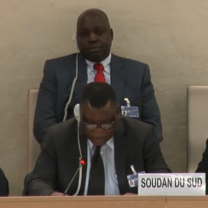Human Rights Council: 34th Session
Adoption of South Sudan’s Universal Periodic Review outcome
Joint Oral Intervention
Thank you Mr. President,
Unfortunately, the East and Horn of Africa Human Rights Defenders Project and CIVICUS have very little to welcome in South Sudan’s UPR process. Out of 33 recommendations made to the Government of South Sudan to improve its catastrophic human rights situation, only 4 have been accepted.
Mr. President, we are dismayed that for the first time since the creation of the UPR process, no local civil society organisation could participate in the UPR Pre-Session. South Sudanese human rights defenders have been intimidated in the corridors of the Palais des Nations, prevented from boarding a flight to Geneva at gunpoint, threatened after meeting with the UN Security Council in Juba, and regularly prevented from cooperating with international mechanisms. The pervasive sense of fear that exists among South Sudanese civil society knows no borders, and neither do the often-real threats against them.
Given how the Government and its security apparatus have treated human rights defenders in the past, it comes as no surprise that it has not accepted recommendations made to improve its human rights record. The UPR process is meant to create an opportunity for dialogue and collaboration between civil society and the government, however South Sudan is demonstrating persistent non-cooperation with this important mechanism.
Mr. President, in light of the current resolution on South Sudan being discussed during this session, we reiterate our deepest concern that South Sudanese human rights defenders face intimidation, torture, death, or exile for working on transitional justice and human rights. The support of international mechanisms such as the UN Human Rights Council has never been more important.

